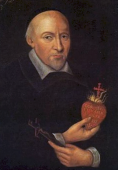HOMILY WEEK 20 03 – Year II
On Being Good Shepherds in the Kingdom of God:
Optional Memorial of St. John Eudes
(Ezk 34:1-11; Ps 23; Mt 20:1-16)
************************************************
Did you know that by our baptism, we are shepherd-kings, called to help shepherd God’s people?
The readings today challenge us to deeper caring and greater openness to the mystery of how God works in our lives.
In the first reading, the prophet Ezekiel chastises the religious leaders of Israel. The same chastisement would apply to the sexual abuse scandal by hundreds of priests, and a possible cover-up by a bishop, in the Diocese of Pittsburgh that surfaced in Autumn of 2018. To Ezekiel, God asserts that God will shepherd God’s sheep. That is what God did in sending Jesus, who is our true shepherd, and who not once used his divine power in a selfish manner. He consistently gave his life away in caring compassion and loving service.
Psalm 23 picks up from that last promise of God to the prophet Ezekiel. Jesus truly is our shepherd, with us at all times, good and bad. Sexual abuse victims who ask, “Where was God when that happened to me?” can take comfort that God, in Jesus, was right there with them, experiencing whatever they were experiencing. As Alana Levandoski sings so well in one of her plaintive songs, “God protects us from nothing, but unexplainably, sustains us in all things.”
Turning to the gospel, this parable does not seem fair on our usual terms, but is designed to stretch us into a deeper understanding of the depth of the Father’s love for us. Imagine a car dealer giving a prospective customer, shopping for a reasonable vehicle, a Mercedes Benz car loaded with extras – no payment needed, just because the dealer felt generous that day. That totally gratuitous, undeserved gesture would come nowhere near close to what God has done for us in giving us his own Son, Jesus Christ.
I got a glimpse into the deeper meaning of this parable one day in my first mission, as I had to leave playing on a ball team to attend to a couple who arrived at the rectory. It was hard paying attention to them as I glanced out the window wistfully at the game I was missing. After the couple left, I ran out to watch the end of the game, only to be welcomed back into it – they had played without me and were glad I was back. There was no anger on their part – I was the one who had missed out on part of the game.
That is how we need to view the kingdom of God – unfortunate are they who miss out on the peace and joy of participating in God’s own eternal life even now, because they think they can find happiness elsewhere. Fortunate are those who walk with Jesus and live in his Spirit each day of our lives – already participating in the heavenly ball game.

St John Eudes
St. John Eudes, whom we honor today, is a good example for us. John became a priest, despite his parent’s wish that he marry, and gave his life to caring for the sick. He opposed the heresy of Jansenism in France, worked for clerical reform, reached out to fallen women and founded the religious congregation of Jesus and Mary (the Eudists). In the decree of his beatification in 1908, Pope Pius X declared John Eudes to be the father, doctor and apostle of devotions to the Sacred Heart and to the Immaculate Heart of Mary. He was canonized in 1925. His ministry could be seen as fairly radical. In the context of a corrupt church (higher clergy were rich, guarding their privileges, and the country was run and wars waged by a cardinal), setting up seminaries to ensure proper education of priests became itself a revolutionary act and the encouragement of devotion to the Sacred heart became not a sweet pious platitude but a defiant proclamation that the center of God’s essence is his love, not condemnation.
The Eucharist is a foretaste of that heavenly banquet, and an experience of God’s eternal life already as forgiveness and healing, every time we celebrate it with sincere faith. May our celebration strengthen our faith to be more like that of St. John Eudes, and deepen our experience of the kingdom of God here and now.



